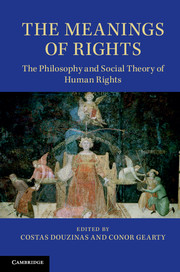Book contents
- Frontmatter
- Contents
- Notes on contributors
- Introduction
- Part I Finding foundations
- Part II Law, rights and revolution
- Part III Rights, justice, politics
- Part IV Rights and power
- 12 Second-generation rights as biopolitical rights
- 13 History, normativity, and rights
- 14 “All of us without exception”: Sartre, Rancière, and the cause of the Other
- 15 However incompletely, human
- 16 Welcome to the “spiritual kingdom of animals”
- Index
- References
14 - “All of us without exception”: Sartre, Rancière, and the cause of the Other
Published online by Cambridge University Press: 05 June 2014
- Frontmatter
- Contents
- Notes on contributors
- Introduction
- Part I Finding foundations
- Part II Law, rights and revolution
- Part III Rights, justice, politics
- Part IV Rights and power
- 12 Second-generation rights as biopolitical rights
- 13 History, normativity, and rights
- 14 “All of us without exception”: Sartre, Rancière, and the cause of the Other
- 15 However incompletely, human
- 16 Welcome to the “spiritual kingdom of animals”
- Index
- References
Summary
How not to write the history of human rights
In an article entitled “Bleeding Humanity and Gendered Embodiments: From Antislavery Sugar Boycotts to Ethical Consumers,” published in 2011 in the new and highly respected journal Humanity, Mimi Sheller offers an intriguing example of where the conversation has gotten on the increasingly linked subjects of human rights and humanitarianism. According to Sheller, white women who participated in the anti-slavery sugar boycotts of the late eighteenth century, an early instance of what Jacques Rancière calls “the cause of the other,” were really interested in asserting their superiority over black women. This is not quite what Sheller says, but I think it is a reasonable approximation. Consider: “the making of the female ethical consumer as a humanitarian actor involved techniques of differentiating the white woman from the enslaved woman, remaking (rather than dislodging) the very forms of difference that enslavement pivoted upon” (174). Here the studied abstractness of the phrasing seems calculated to avoid a direct charge of evil intentions. The differentiating of white from black women is attributed only to the “techniques,” not to the white women themselves. But why should “techniques” have any intentionality at all? Who else but the white women who wielded these techniques can be held responsible? That Sheller does in fact want her reader to hold the white women responsible is suggested by the parenthetical phrase “rather than dislodging.” This phrase implies that there was another option available and that the white women were free to choose it. Why didn’t they opt to dislodge the forms of difference that separated them from female slaves? It’s their own fault that instead they re-made the forms of difference, thus defending and preserving their supposed superiority. No charge is filed, but they have nonetheless been found guilty.
- Type
- Chapter
- Information
- The Meanings of RightsThe Philosophy and Social Theory of Human Rights, pp. 251 - 271Publisher: Cambridge University PressPrint publication year: 2014
References
- 10
- Cited by



